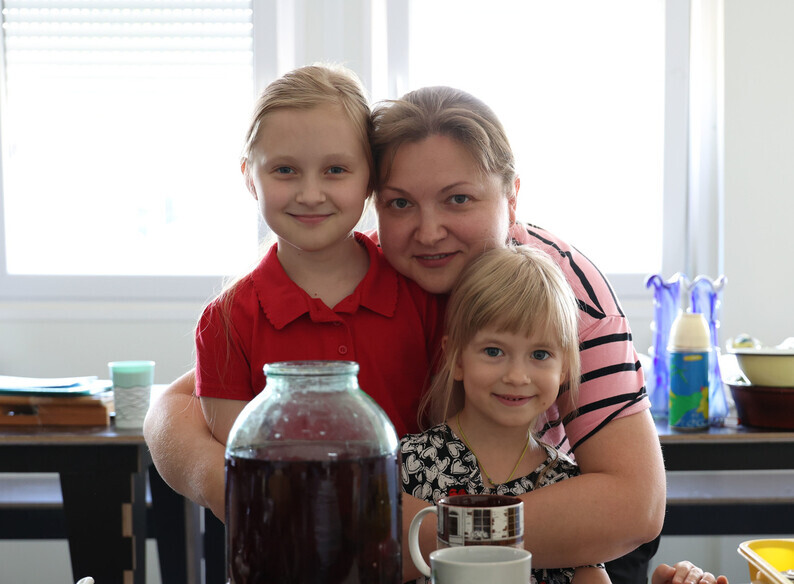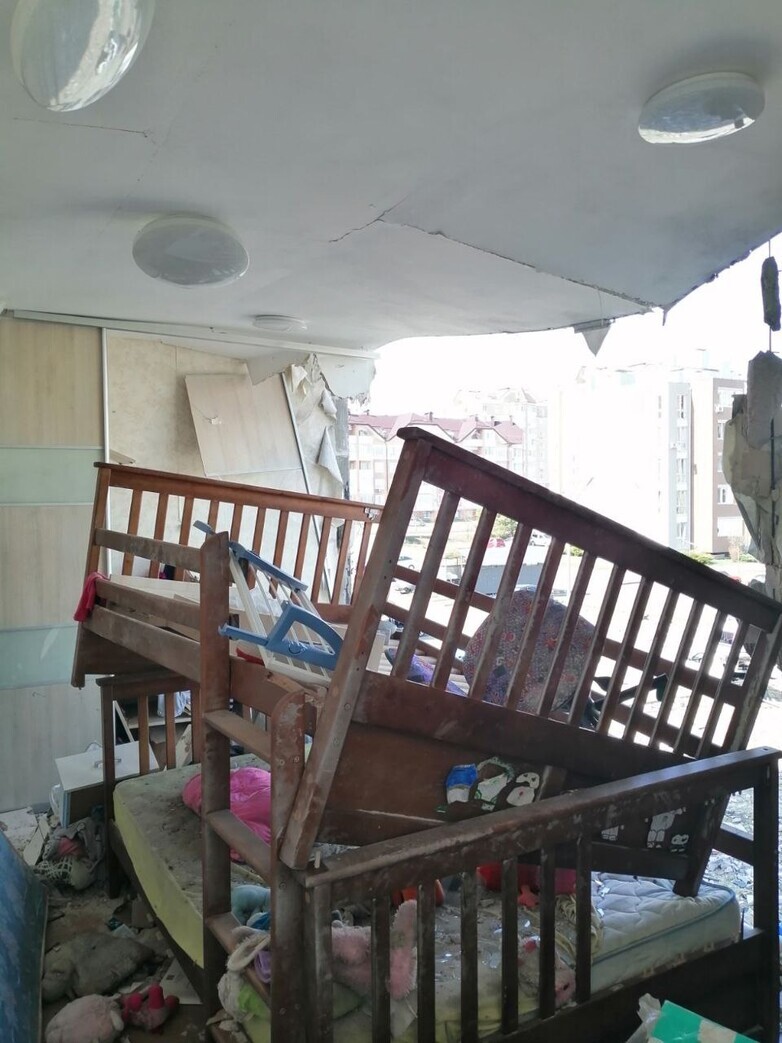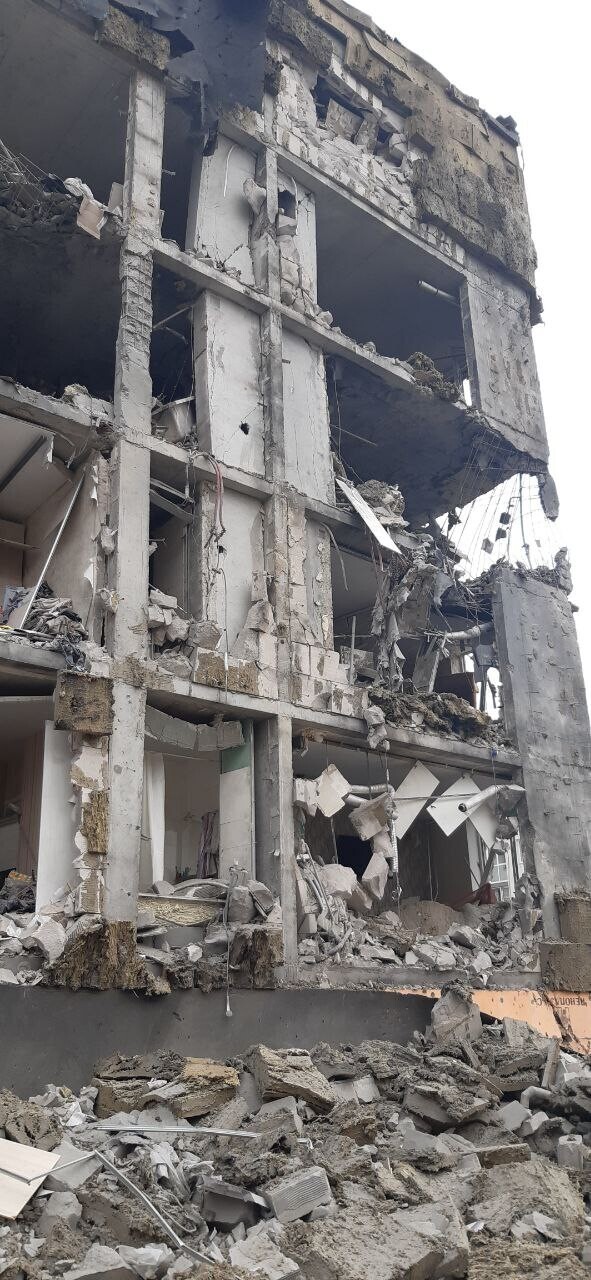hankyoreh
Links to other country sites 다른 나라 사이트 링크
[Interview] With a boom, a family’s Bucha home was turned to rubble

Oksana Polishuk’s heart starts racing every time she thinks about what happened the night of March 4. The Russian military had infiltrated Bucha, where she lives with her two daughters and husband, the day before. That night, the 41-year-old mother was tossing and turning on the mattress she had put on the bedroom floor with her daughters, Bozena and Kira, each six and nine years old. Then, she heard the sound of airplanes. With a boom, dust flooded into her eyes, nostrils, and open mouth.
A bomb dropped from the skyOksana opened her eyes, but everything was a blur; she couldn’t see a thing. She and her daughters were struck by incredible physical force. A bomb from the sky burst into the third floor of the apartment building where the Polishuk family lived. Just one floor below was where Oksana, her husband Andriy, and their two daughters called home.
After the bomb hit the apartment building straight on, the impact knocked down the bunk bed where the kids slept. The mattress on the bottom bunk bed was thrust onto Oksana and the children, who were lying on the floor. Debris from the destruction crumbled onto the soft mattress, shielding the three from the detritus.
Having come to her senses, Oksana tried to get out, but the door wouldn’t open. Oksana’s husband was nowhere to be found. That moment, Oksana saw people attempting to escape through the wall that was no more. “Help!” Oksana shouted at the top of her lungs.
“If my mouth wasn’t open, I would have died,” Oksana said. Only later did she learn that having your mouth closed during an explosion can be fatal. With your mouth open, injuries like ruptured eardrums can be avoided. “I swallowed so much dust that I coughed for four days straight. I vomited dust. But we were lucky to have made it out without getting too hurt.”
In hindsight, Oksana did well to put down the mattress on the top bunk bed onto the floor just in case something happened. She and her two daughters were unscathed, but her husband was injured in the explosion. Some kind of debris — either from the bomb or a chunk of cement — had struck him on the head.
“At least he’s still alive,” Oksana said. The third floor, which was hit directly by the bomb, was empty at the time — if not, things could have been worse.
The apartment building was utterly destroyed. Its outer walls were blown away, and all the windows were shattered.
“The apartment is still caving to this day,” Oksana said while speaking with the Hankyoreh on June 15 at her temporary residence in a modular home in Bucha.

On March 5, the day after the explosion, Oksana’s family returned to the wreckage that was their apartment and dragged their mattresses down to the basement. That’s when they rescued a cat that had been buried in the debris.
Until March 9, when they left Bucha, they lived beneath the ruins of their former home. The basement housed 150 other residents, 40 of whom were children. It was so dark underground that they didn’t even notice that their bodies were covered in bruises. Injuries and bruises stayed hidden beneath bundles of clothes layered on top of each other due to the cold.
It wasn’t until five days later, when they escaped to Kyiv and finally got to shower, that they discovered the cuts and bruises that covered them. During the time they had been hunkering underground, shivering due to fear and the cold, they hadn’t felt so much as a twinge of pain from their injuries.

On March 9, five days after their apartment had been bombed, Oksana’s family went to Bucha City Hall after hearing the news that a humanitarian corridor would be opened. The area was packed with people waiting for buses to come. Then, they saw a man driving out of Bucha in his car. They couldn’t wait any longer. Oksana’s family piled into their car and followed suit.
During the bombing, the roof of Oksana’s family car had caved in, its windshield had shattered. Still, people set off to Kyiv, driving their own cars. A caravan of hundreds of vehicles moved down the road.
“Everyone was scared, so we all drove slowly. We all had our car doors flung open, since we would have to escape immediately if anything dropped from the sky.”
When a Russian tank passed by, Oksana couldn’t breathe. She had heard rumors that the Russian military used their tanks to crush passing Ukrainian vehicles.
“I was really scared then. I couldn’t feel a thing in my legs. I felt paralyzed.”
With bated breath, people continued to head towards Kyiv as slowly as possible. The distance between Bucha and Kyiv is 30 kilometers, but it took nine hours for Oksana’s family to arrive at the capital city.
When they arrived in Kyiv’s city center controlled by the Ukrainian military, people stepped out of their cars and kissed the ground beneath them. Some people even shed tears. But even after escaping Bucha, Oksana could neither laugh nor cry for a long while.
“I was still shocked,” she said. Car sounds, the sound of people — every noise startled her. She couldn’t even listen to music. Two weeks had passed when she finally wept, watching the news on the television reporting the war.
Back to Bucha, tormented by nightmares of MarchAfter Kyiv, Oksana stayed at a relative’s place in the relatively safe Vinnytsia until returning to Bucha on May 19. Russian forces retreated from the vicinity of Kyiv in late March.
“I still can’t sleep at night. I went to a psychiatrist, who gave me these pills. I started taking stabilizers, sleeping pills, and antidepressants.”
Every time she walked around her old neighborhood, she had panic attacks. The nightmare of that night returned.
“If the city compensates me monetarily rather than with a new house, I want to move to a different place. I don’t want to live in Bucha. I keep thinking about that night.”
Though the neighborhood is familiar, with lots of acquaintances and friendly neighbors to spend time with, life in Bucha constantly reminds her of March.
“How am I now? I’m much better than I was when this all started. But I still need more time.”
Speaking to reporters at her temporary residence in Bucha on June 15, Oksana spent some time explaining to them about the “tricks” for dealing with Russian troops.
“Russian snipers fire at people who run,” she said. “When you see Russian soldiers, you should just take a step back and freeze or lie down on the ground and crawl.”
“If they start firing, you should hide and wait until the gunshots stop, or else lie down on your stomach and cover your head with your hands,” she continued.
“I’ve heard the sounds of Russian multiple rocket launchers so many times that I can count how many have been fired. The mortars make a whistling sound when they fly in,” she also said. These tips are Oksana’s survival strategy.
By Noh Ji-won, staff reporter
Please direct questions or comments to [english@hani.co.kr]

Editorial・opinion
![[Editorial] Penalties for airing allegations against Korea’s first lady endanger free press [Editorial] Penalties for airing allegations against Korea’s first lady endanger free press](https://flexible.img.hani.co.kr/flexible/normal/500/300/imgdb/original/2024/0502/1817146398095106.jpg) [Editorial] Penalties for airing allegations against Korea’s first lady endanger free press
[Editorial] Penalties for airing allegations against Korea’s first lady endanger free press![[Editorial] Yoon must halt procurement of SM-3 interceptor missiles [Editorial] Yoon must halt procurement of SM-3 interceptor missiles](https://flexible.img.hani.co.kr/flexible/normal/500/300/imgdb/child/2024/0501/17145495551605_1717145495195344.jpg) [Editorial] Yoon must halt procurement of SM-3 interceptor missiles
[Editorial] Yoon must halt procurement of SM-3 interceptor missiles- [Guest essay] Maybe Korea’s rapid population decline is an opportunity, not a crisis
- [Column] Can Yoon steer diplomacy with Russia, China back on track?
- [Column] Season 2 of special prosecutor probe may be coming to Korea soon
- [Column] Park Geun-hye déjà vu in Yoon Suk-yeol
- [Editorial] New weight of N. Korea’s nuclear threats makes dialogue all the more urgent
- [Guest essay] The real reason Korea’s new right wants to dub Rhee a founding father
- [Column] ‘Choson’: Is it time we start referring to N. Korea in its own terms?
- [Editorial] Japan’s rewriting of history with Korea has gone too far
Most viewed articles
- 160% of young Koreans see no need to have kids after marriage
- 2Months and months of overdue wages are pushing migrant workers in Korea into debt
- 3[Editorial] Penalties for airing allegations against Korea’s first lady endanger free press
- 4[Guest essay] Maybe Korea’s rapid population decline is an opportunity, not a crisis
- 51 in 3 S. Korean security experts support nuclear armament, CSIS finds
- 6[Reporter’s notebook] In Min’s world, she’s the artist — and NewJeans is her art
- 7Bills for Itaewon crush inquiry, special counsel probe into Marine’s death pass National Assembly
- 8S. Korea discusses participation in defense development with AUKUS alliance
- 9Japan’s standards for use of preemptive counterstrike against N. Korea remain unclear
- 10Trump asks why US would defend Korea, hints at hiking Seoul’s defense cost burden